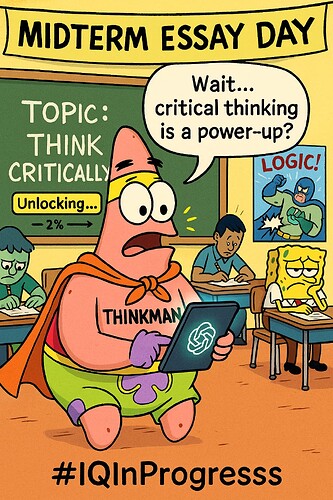 Wait… ChatGPT Is Bad for Brains Now?
Wait… ChatGPT Is Bad for Brains Now?
A new MIT study says using ChatGPT to help write essays might be like swiping a “mental credit card.” Quick payoff, long-term cost. Less brain activity, worse memory, no ownership. But before setting fire to the internet, let’s break it down.
Here’s what the study actually did (yes, it exists):
![]() 54 people wrote short essays—some with AI, some with Google, some with just brainpower.
54 people wrote short essays—some with AI, some with Google, some with just brainpower.
![]() A few weeks later, they swapped groups to see what changed.
A few weeks later, they swapped groups to see what changed.
![]() Electrodes measured brain activity.
Electrodes measured brain activity.
![]() AI and human judges scored the writing.
AI and human judges scored the writing.
 What They Found (No, Not That You’re Dumb)
What They Found (No, Not That You’re Dumb)
| Group | Brain Activity | Memory Recall | Felt Like “Their Work”? |
|---|---|---|---|
| Brain-only | High (lights on!) | Strong | Proud parent vibes |
| Google users | Medium (semi-lit) | Okay-ish | Fine, whatever |
| ChatGPT users | Low (power-saving) | Poor (who wrote this?) | “Who dis?” energy |
LLM users even had trouble quoting their own writing. Yes, really.
 But Before Freaking Out
But Before Freaking Out
This wasn’t a huge global experiment.
![]() Only 18 people finished the full study.
Only 18 people finished the full study.
![]() All were elite students (so, not your uncle using AI to write Facebook rants).
All were elite students (so, not your uncle using AI to write Facebook rants).
![]() The task? Writing tiny essays in a lab. Not building rocket ships.
The task? Writing tiny essays in a lab. Not building rocket ships.
![]() Most ChatGPT users didn’t even edit. They just copied and hit submit.
Most ChatGPT users didn’t even edit. They just copied and hit submit.
So yes, they got lazy. But that doesn’t mean you have to.
 Sprinkle of Salt, Please
Sprinkle of Salt, Please
The internet responded the way the internet does:
- “This is like blaming calculators for bad math grades.”
- “EEG just shows effort, not intelligence.”
- “The tool isn’t the problem. The user is.”
- “Only 18 kids wrote essays? MIT, you okay?”
- “It’s not offloading memory that’s bad—it’s offloading judgment.”
- “Using ChatGPT is like microwave meals. Fast, but do you feel like a chef?”
 So What’s the Real Problem?
So What’s the Real Problem?
Not that ChatGPT writes badly.
Not that brains shrivel up after one prompt.
But that using AI lazily trains the brain to stop thinking.
When people don’t question, revise, or challenge the AI—they don’t learn.
That’s not artificial intelligence. That’s artificial laziness.
 Some Clarity for the Rest of Us
Some Clarity for the Rest of Us
Old Problem, New Tool:
→ Books made people stop memorizing.
→ Calculators stopped mental math.
→ Google stopped knowing anything deeply.
→ ChatGPT is just next on the blame list.
But tools aren’t evil. They reflect how they’re used.
 Use ChatGPT Like a Brain Booster, Not a Brain Bypass
Use ChatGPT Like a Brain Booster, Not a Brain Bypass
Instead of:
“Write this for me, thanks.”
Try:
“Here’s what I’m thinking—help me sharpen it.”
→ Reject the first draft.
→ Ask questions.
→ Argue with it.
→ Edit aggressively.
→ Build with it, not around it.
Good use = higher thinking.
Bad use = fast junk.
 In Summary:
In Summary:
ChatGPT isn’t the villain.
Comfort is.
The real damage comes when thinking becomes optional and “quick answers” become the goal.
Don’t fear AI.
Fear the day no one checks what it says.
 Bonus Brain Tools & Full Study Links
Bonus Brain Tools & Full Study Links
- Full study PDF: arxiv.org/pdf/2506.08872
- Study overview: media.mit.edu/your-brain-on-chatgpt
- AI counter-analyses: Google Doc Review
- Related article: Why writing by hand helps memory
 Final Smartass Thought
Final Smartass Thought
“Doing essays yourself takes effort.”
– Shocking conclusion of a 200-page research paper.
Use the tool. Don’t become one.

 !
!